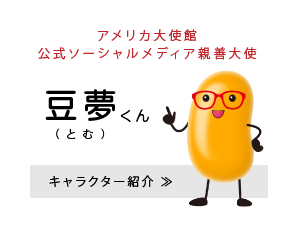日米関係
日米主要文書 ー 文化交流関係
Cultural Relations – Major Documents
The US-Japan Conference on Cultural and Educational Interchange (CULCON) has its origins in meetings held in Washington in 1961 between President John F. Kennedy and Prime Minister Hayato Ikeda. In their joint communiqué of June 22, 1961, they agreed to the establishment of a United States-Japan Committee to study expanded cultural and educational cooperation between the two countries.
Since its first meeting in Tokyo in January, 1962, CULCON, has served to focus official and public attention in both the United States and Japan on the vital cultural and educational underpinnings of our relationship.
CULCON has taken up a wide agenda in its meetings. It has worked to encourage more translation, to improve the respective images of the two countries in each other’s textbooks and media, to promote sharing of museum exhibits and documents, and to stimulate exchanges of educators, journalists and artists. In so doing, it has helped lay the foundation of friendship and trust that now bears the enormous weight of the economic and political relationship that the United States shares with Japan.
In the Tokyo Declaration, the result of the 1992 meeting between President Bush and Prime Minister Miyazawa, specific mention is made of CULCON as a means to continue exploring cultural and educational issues between Japan and the United States.
In 1991, permanent secretariats were established in Tokyo and Washington to provide continuity to CULCON activities. The US CULCON panel secretariat is housed at the Japan-United States Friendship Commission, an independent federal agency. The US CULCON secretariat is supported by funds from the US Department of State, Bureau of Educational and Cultural Affairs.
At its April, 1993 plenary session, and again at its January, 1995 and May, 1997 plenary sessions, CULCON called for an effort to “significantly increase the number of American undergraduates studying in Japan in order to build better understanding and closer relations between the two countries.” CULCON has actively worked toward its goals in undergraduate educational exchange in addition to activities in media cooperation and information access between the two countries.
CULCON XIX, a plenary session held in Okinawa, Japan in February, 1999, provided the opportunity to review activities to date and to recommend a new joint initiative in digital archiving. Since then, the work of the Digital Culture Working Group has been the highest priority of CULCON, helping it harness the power of the Internet to its mission of improving educational and cultural relations between the two countries.
2014
- 第26回日米文化教育交流会議(カルコン) 共同声明 (2014年11月17-18日)
- JOINT STATEMENT U.S.-Japan Conference on Cultural and Educational Interchange (CULCON) CULCON XXVI (November 17-18, 2014)
- カルコン教育タスクフォース 報告書 2013-2014/CULCON Education Task Force Report
- Arts Dialogue Committee Report to CULCON XXVI/美術対話委員会報告書
2013
2012
2011
2008
- CULCON XXIII, Executive Summary and Recommendations (June, 2008)
- 第23回日米文化教育交流会議(カルコン) 日米関係の再定義(要約および提言)(仮訳) (2008年6月)
- CULCON XXIII, General Policy Recommendations (June, 2008)
2007
- U.S.-Japan Educational, Cultural Programs Strengthen Alliance (May 2, 2007)
- 日米同盟を強化する教育・文化プログラム (2007年5月2日)
- 日米文化教育交流会議(カルコン)の改革について(外務省のサイトへのリンク) (2007年4月27日)
2006
- CULCON XXII, Joint Statement (Jul. 24-25, 2006)
- 第22回日米文化教育交流会議(カルコン)
2003
- CULCON XXI Joint Statement (Nov. 20-21, 2003)
- 第21回日米文化教育交流会議(カルコン) (2003年11月20日-21日)
2001
- CULCON XX Joint Statement (May 10-11, 2001)
- 第20回日米文化教育交流会議(カルコン)
1999
- CULCON XIX Joint Statement (Feb. 18-19, 1999)
- 第19回日米文化教育交流会議(カルコン)
1997
- CULCON XVIIIJoint Statement (May 8-9, 1997)
- 第18回日米文化教育交流会議(カルコン)
1995
- 第17回日米文化教育交流会議(カルコン) (Jan. 19-20, 1995)
1993
- 第16回日米文化教育交流会議(カルコン) (Apr. 29-30, 1993)
1991
- より強力なカルコンに向けて(仮訳) (Towards Strong CULCON) 1991年3月(東京)採択された提言書 (March, 1991)
- 第15回日米文化教育交流会議(カルコン) 議長サマリー
1988
1986
1984
1982
1980
1978
1977
1976
1961
- Mutual Education and Cultural Exchange Act of 1961 (PL87-256; Fulbright-Hays Act; UNITED STATES CODE TITLE 22: CHAPTER 33) (1961)
- 池田総理大臣とケネディー大統領との間の共同声明 (カルコン関係部分抜粋) (Jun.22, 1961)
The Japan-US Friendship Commission (JUSFC or “the Commission”) is an independent federal agency that provides support for training and information to help prepare Americans to be tter meet the challenges and opportunities in the US-Japan relationship through grant programs for institutions.





